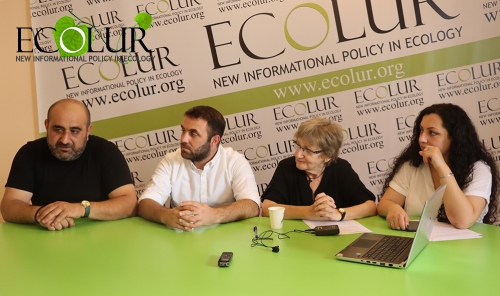

Armenia has undertaken international obligations in the climate and energy sectors and is implementing reforms in legislation. The main targets of these policies are the communities. However, they are not sufficiently informed, as a result, they do not fully participate in decision-making processes. Therefore, the real socio-ecological needs of the communities are not fully reflected in the climate and energy policies.
During the press conference, EcoLur’s team presented its social and ecological needs assessment studies in 4 communities of Armenia, namely Talin, Aragatsotn Region, Dilijan, Tavush Region, Yeghegis, Vayots Dzor Region and Pambak, Lori Region. The studies have been carried out within the framework of “Impacted communities and civil society organizations as participants in the introduction of socio-ecological culture in the energy and climate change policies of Armenia” project implemented with the support of the UNDP/GEF Small Grants Program and "EU for Climate" regional project.
"Our goal is for the communities to move on the path of sustainable development. We will submit a package of recommendations to RA government regarding the reforms in the climate and energy sectors," EcoLur Informational NGO President Inga Zarafyan noted.
"Our main goal is for communities to be able to take advantage of climate and energy policies, to protect their interests by implementing climate change mitigation and adaptation programs, measures to reduce energy poverty," EcoLur Informational NGO Deputy President Victoria Burnazyan outlined.
Narek Tutkhalyan, EcoLur's partner in Talin Community, President of "Community and Youth" Youth Advisory NGO presented the main issues.
"In recent years, the construction of solar plants in Tallinn has progressed rapidly, and the community was not really prepared that one day it would become a solar community. Expropriation or donation of communal lands to large investors has kicked off. The community does not have a series of complex actions, what it expects to perform with the money received from investors. Those funds are used partly for development projects, partly for everyday problems," Narek Tutkhalyan said.
Oleg Dulgaryan, President of "Center for Community Mobilization and Support" NGO, presented the problems in Pambak Community.
"Pambak Community has settlements with different problems and opportunities. In all settlements, there is a problem of coping with climate change, the level of people's awareness is low, there is a need to implement a policy of climate adaptation and resistance in the settlements, which should create opportunities for the community", Oleg Dulgaryan noted.
Ruzan Ghazaryan, President of "Work and Homeland" NGO, presented the problems in Yeghegis Community.
"Springs are drying up and water resources are decreasing, which brings difficulties for animal husbandry and agriculture. We are experiencing resident-SHPP and human-nature conflicts," Ruzan Ghazaryan said.
The climate challenges in Dilijan community were presented by Albert Haroyan, President of “Ecopolicy” Environmental Center for Secure and Developed Community” NGO.
"People are aware of the dangers that climate change brings. This shift is clearly visible in Dilijan. The first is the scarcity of drinking water, which both residents and tourists feel. Secondly, climate change affects the forest: the number of forest fires increased. Heavy rains can activate the landslides in Dilijan," Albert Haroyan said.
Roza Julhakyan, Expert at "EcoLur" Informational NGO, spoke about the possibilities of sustainable development of communities. "Communities have several possibilities to implement climate and energy projects. One of them is the subsidy programs, which need to be evaluated from the perspective of climate change," Roza Julhakyan stressed out.
September 15, 2023 at 16:08
